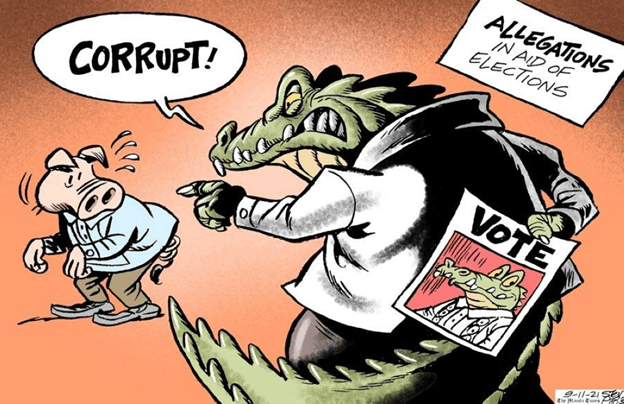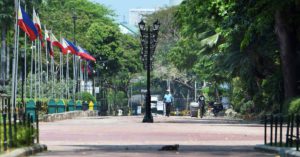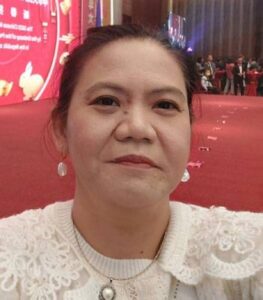
The Philippines at the moment is not only confronted by the new surge in COVID-19 cases and the threats it poses to its society, but rather the last couple of weeks were also full of controversy surrounding the Commission on Audit’s (COA) 2020 Consolidated Annual Audit Report, which covers findings until 31 December, 2020, that flagged the Department of Health (DOH) for alleged questionable procurement, un-utilized medical equipment, non-payment of COVID-19 allowance, among others, for health care workers.
The Commission also reported on the alleged non-compliance of the DOH with laws in spending the PHP 67.3 billion (US$1.27 billion) fund for the country’s fight against the COVID-19 pandemic.
However, it was not only the DOH that has been flagged by the COA but some other government agencies as well. But the DOH seems to be the favorite “punching bag” of the political opposition these days since it’s at the forefront of the country’s fight against the COVID-19 pandemic.
Politicizing COA’s Reports
No doubt, the political opposition has politicized the COA’s preliminary findings to paint the incumbent administration in a bad light, while unfairly crucifying the DOH and its officials in public although the COA report is not conclusive yet. Take note, the COA findings are not final and agencies that were flagged like the DOH have 60 days to respond and comply with COA recommendations based on its findings.
Playing dirty politics seems to be the name of the game these days as the 2022 national election draws near. This is despite the press statement released by the COA on its website on 16 August 2021 which says: “The report itself does not mention any findings by the auditors of funds lost to corruption.”
The said press statement also states that “some of the findings of deficiencies involving COVID-19 funds amounting to PHP 67.3 billion (US$1.27 billion) resulted from the non-submission of documentation or supporting papers, which the DOH may still submit in compliance with the auditor’s recommendation. Of the PHP 67.3 billion, PHP 42.4 billion (US$849 million) consisted of fund transfers to procurement/implementing partner agencies without the required documentation. There is no finding that this amount cannot be accounted for. The breakdown of the PHP 67.3 billion and the deficiencies found are clearly explained in Annexes IV and V of the Consolidated Annual Audit Report of the DOH.”
The COA also explained that “as there are recommendations for compliance by the DOH, the audit process for the deficiencies pointed out has not been completed. Hence, it is premature at this stage to make conclusions on the findings in the Consolidated Annual Audit Report.”
DOH Response To COA’s Findings
In response to the COA’s preliminary findings, in a press release issued by the DOH on 16 August 2021 and published on its website, it said that, “the PHP 67.3 billion “deficiencies” flagged by COA have been mostly resolved by DOH and its operating units and that most of COA’s findings have already been addressed or are currently being addressed by DOH.”
According to the DOH, “the reported unobligated allotment of PHP 11.8 billion (US$236.2 million) last 2020, most of these funds remained available for use in 2021. The PHP 5.1 billion (US$102.1 million) of this amount is part of the Continuing Appropriation of Bayanihan Act II, of which 83 percent or PHP 4.2 billion (US$84.1 million) has been utilized as of 30 June, 2021; as for the PHP 4.7 billion (US$94.1 million) under Foreign Assisted Projects (FAPs), this was requested for Special Allotment Release Order (SARO) in FY 2021 to pursue the unmet target of PHP 3.4 billion (US$68 million).”
Also, the DOH further explained that “the deficiencies noted regarding PHP 1.4 billion (US$28 million) in-kind donations for which hospitals missed the submission of summary reports or lists of donations have already been addressed. The COA findings on unauthorized grant of meal allowances have also been settled and the PHP 4.8 million (US$96.1 million) unpaid financial assistance to healthcare workers was already duly paid by concerned DOH regional offices.
On the issue of the PHP 42.4 billion (US$849 million) fund transfers to the Procurement Service (PS) of the Department of Budget and Management (DBM) and Philippine International Trading Corp (PITC) for the procurement of COVID-19 supplies with COA’s observation that the funds were transferred without a Memorandum of Agreement (MOA), which in many ways is the subject matter of the current Senate hearings, DOH has responded that “there is no need for a MOA for the transaction since the items procured, the PPEs, testing kits, and other equipment needed for the COVID-19 response have been classified as common-use supplies due to the pandemic.”
Concerning the PHP 5.1 billion (US$102.1 million) procedural and documentary deficiencies flagged by COA, DOH explained that “the PHP 2.5 billion (US$50 million) has been addressed by the Procurement Service of the DOH Central Office. Meanwhile, the remaining PHP 2.5 billion is currently being addressed by operating units in compliance with the COA recommendations.”
Whereas, on the issue of the PHP 74 million (US$1.4 million) worth of unutilized medical equipment and supplies, the DOH explained that, “to date, most of the determined “unutilized” medical equipment and supplies are being used and the deliveries of procured equipment have already been completed.”
Hypocrisy And Selective Attention
According to House Deputy Speaker Congressman Rodante Marcoleta, Party-Representative for SAGIP, what these senate hearings represent which have now verged on the alleged overpriced procurement of PPEs (Personal Protective Equipment) while questioning the companies that supplied these indispensable, vital, and medical-grade PPEs that were badly needed by medical front liners during the early days of the pandemic, is “selective attention,” – a process of focusing on a particular object in the environment for a certain period.
In his privilege speech at the House of Representatives on 6 September, 2021, Marcoleta brought to light the duplicity and hypocrisy of those senators pushing and leading these senate hearings and begged the question, “Whatever happened to the findings in the 228-page 2013 Annual Audited Report of COA submitted to Congress in the same year? The PHP 10.14 billion (US$203 million) unliquidated cash advances were reported and widely circulated by several newspapers in November 2014.”
Marcoleta pointed out that, “The said COA audit report disclosed that five (5) top executives of the Aquino administration failed to liquidate their cash advances, namely: former Sec. Mar Roxas of the DILG, PHP 1.1 billion (US$22 million); former Sec. Voltaire Gazmin of the DND, PHP 685.6 million (US$13.7 million); former Sec. Leila De Lima of the DOJ, PHP 617.4 million (US$12.3 million); former Sec. Dinky Soliman of the DSWD, PHP 452.5 million (US$9 million); and former Sec. Proceso Alcala of the DA, PHP 354.5 million (US$7 million).
He also mentioned that there was also a finding in the 2013 COA Annual Audit Report concerning the Philhealth Board, which then included now Sen. Risa Hontiveros, granted PHP 1.76 billion (US$35.2 million) illegal bonuses to the officers and employees of said agency despite the issuance of previous Notices of Disallowance and despite COA’s repeated decisions sustaining those actions.
The COA also affirmed that the Board Resolution granting said bonuses were not submitted to the Office of the President, through the DBM, for approval as required under Section 6 of Presidential Decree No. 1597.
Marcoleta also reiterated that in 2014, he recalled that based on the 2014 COA Annual Audit Report, COA revealed to the media that the DILG has yet to account for more than PHP 7.0 billion (US$140.1 million) worth of funds, transferred for various projects implemented under the term of then-Secretary Mar Roxas.
He also contended that there’s a need as well to find out what happened to the initial findings of COA that PHP 625 million (US$12.5 million) funds were released to senior citizens with double entries. He also mentioned that in the 2015 COA Audit Report another cash advance related to the APEC meeting, amounting to PHP 1.0 billion (US$20 million) remains unliquidated to this day by the DILG.
Marcoleta further beseeched the question, “So, what happened to these findings in 2013, 2014, and 2015? Why were these anomalies not subjected to Senate investigations, and why did not the mainstream media relentlessly report these, like what they do so flamboyantly today? And why this selective attention, if not selective memory?
Overpriced Or Bad Politics?
Moreover, it is but far-fetched and unthinkable to even contemplate that these senators do not understand the basic axiom of the “law of supply and demand,” – a theory that explains that “If demand increases and supply is low or remains unchanged, then it leads to a higher price. If demand decreases and supply is high or remains unchanged, then it leads to lower price.”
As we all know, in the early days of the COVID-19 pandemic, there was a problem in the global supply chain for medical gear and equipment like PPEs due to limitations in production and logistics.
During those times, globally, there was surging demand for PPEs, partly due to panic buying and hoarding, which disrupted the normal flow in the global supplies of PPEs. Demand had surged, there were production backlogs of 4 to 6 months, and stockpiles had been depleted, overwhelming the global production capacity, leading to soaring and dramatic price increases.
Based on World Health Organization (WHO) data, there was a sixfold increase in prices for surgical masks; threefold for respirators; and a doubling in the price of gowns during the early days of the COVID-19 pandemic. Based on some reports, at that time, there were even export bans of PPEs and key materials imposed by other countries.
Given the situation, the Philippine government responded to the challenge of providing the needed medical grade PPEs for its frontline health workers at the earliest time possible to ensure their safety and to stop the increasing deaths of medical workers during the early days of the COVID-19 pandemic regardless if the price of PPEs it sourced out was a little bit higher compared to prices during a normal situation.
Take note, the country was in survival mode at that time and was desperate in sourcing out these needed PPEs despite them being pricey to save the lives of the country’s doctors, nurses, and other medical practitioners.
On the issue of PPEs sourced from two Chinese companies namely the Xuzhou Construction Machinery Group (XCMG) and Pharmally Pharmaceutical Corp during the early days of the pandemic, alluding that the Philippine government favored companies from China over local entities is but far-fetched. Why?
First and foremost, there was not much supply in local markets of medical-grade PPEs during the early days of the pandemic. Second, China is the major producer of PPEs in the global trade network. China plays a central role not only in the production but also in the export of PPE products to Asia and the rest of the world now and before the pandemic.
And given the global shortage of PPEs during the early days of the pandemic of which the Western world was hoarding these medical supplies, it was pragmatic for President Duterte to capitalize on the country’s good bilateral relations with China to source out these needed medical grade PPEs to save the lives of the country’s medical practitioners.
Source: Sovereign PH
https://sovereignph.com/2021/09/13/overpricing-or-investigations-in-aid-of-election/



